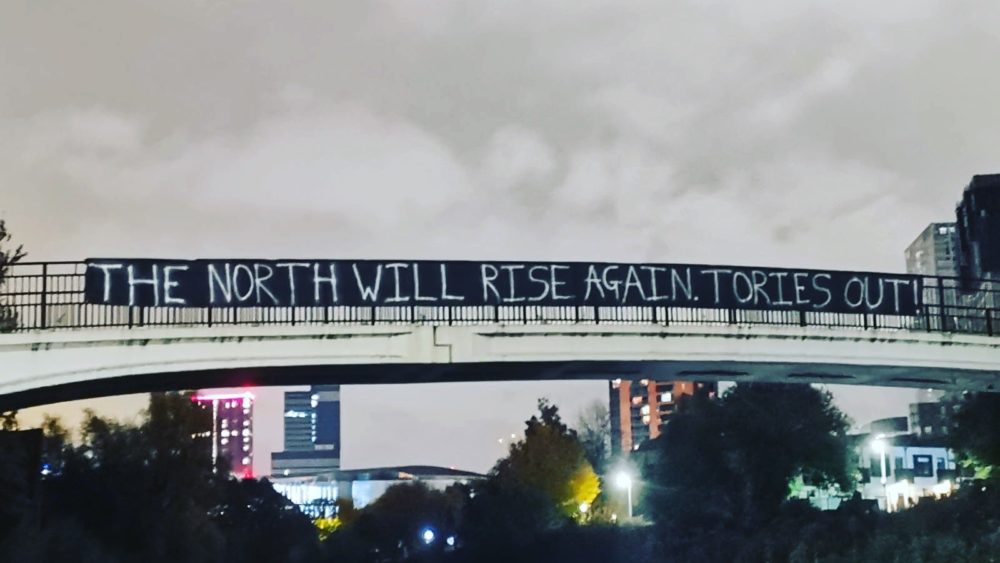“Brutal, this is no way to run the country in a national crisis.”
This was Greater Manchester Mayor Andy Burnham’s reaction to finding out on live television through an email that his region was to receive only £22 million out of the £65 million he had asked of Westminster to support businesses affected by new lockdown measures. However, his quote would not be out of place in the pubs, restaurants and hotels around the country suffering unprecedented economic hardship thanks to new lockdown measures imposed by Westminster.
The situation is rapidly evolving, but as it stands it appears that Manchester will now be offered £60 million, considerably less than the £90 million they initially asked for. It is difficult to argue with Burnham’s claim that the North of England is “the sacrificial lamb for an ill-thought Downing street policy which doesn’t make sense in the real world.”
While some have accused Burnham of strongman posturing, it is bizarre to accuse a local leader of actually having the conviction to stand up for those he was elected to serve and demand financial support from Westminster. The neoliberal establishment and their client journalists in the commentariat have damned devolved governments in the UK, claiming that political dissent amounts to ungrateful wrecking and disloyalty to the union. Ultimately the division here is between English Conservatives and “everybody else”. This is a familiar picture, but one with increasing fault lines that are visible in Northern England, particularly the amorphous ‘red wall’ won by the Tories in December 2019.
In the case of Burnham’s standoff with Westminster, he was supposedly encouraged by Tory MPs in Greater Manchester to push for a better deal, a truth that was quickly walked back by MPs such as Chris Clarkson who have since lambasted Burnham. Fury about the derisory treatment of Manchester has not been restricted to Labour voters, with Manchester Young Conservatives tweeting:
“Boris has lied about helping us in the north. It’s time for him to go. He’s not a Conservative. He’s got no back-bone or genuine deals. He’s incompetent. He has now lost all the seats we worked so hard in Greater Manchester to win.”
The 2019 Tory election promises to “level up the north” have been proven to be snake oil, and those who flipped to the Conservatives last year will likely rue their mistake for years to come
Sadiq Khan is also staring down a government takeover of Transport for London unless he implements an increase in fares, cuts TFL pensions, increases council tax and a major extension of the congestion charge zone which will heavily impact those on lower incomes within the M25. It appears that any region of England with the gall to elect a Labour government is open to attack, and that the logic of nationalisation is on the table if it helps the Tories centralise power in Westminster, safely out of the reach of Labour thanks to their 80 seat majority. Meanwhile Wales, Scotland and Northern Ireland increasingly walk their own path, enacting their own lockdown policies in a much more decisive way than Westminster.
The union looks increasingly fragmentary, with a recent poll demonstrating 58% of Scots in favour of independence, and an internal market bill that seeks to place a border in the Irish sea, breaching the Good Friday Agreement.

Photo: Messages with ‘End London Rule’ or ‘Northern Republic Now!’ have been put up on highways.
The unilateral nature of the new coronavirus restrictions, essentially diktats from Westminster against predominantly urban Labour-led councils and regional authorities, has provoked outrage
There are a number of historical parallels that have been drawn, with particularly emotive appeals to the traumatic memory of Margaret Thatcher’s ‘managed decline’ of Liverpool in the 1980s, but also to her abolition of the Labour-controlled Greater London Council in 1986. However, such appeals to a more distant past are unnecessary and run the risk of creating a kind of generational dissonance. Instead, we should recognise that Tory austerity in the last decade has had a ruinous impact, disproportionately affecting the North, destroying its capacity to weather the costs of the pandemic.
The derisory sums of money offered to regions like Manchester, Liverpool and South Yorkshire will absolutely not be enough to cover the losses of thousands of businesses during this time of immense socio-economic crisis. Westminster’s pathological obsession with outsourcing public responsibilities to the private sector for astronomical fees is nothing new, but has provoked fury in recent weeks. Serco’s failing test and trace program recently plumbed new depths, only reaching just over 60% of close contacts of people with positive test results, yet days later saw its profits soar by an additional 20% above forecast. A stark contrast was also visible between the £7.80 per person made available to Mancunians and the £7,000 per day paid to some BCG consultants for their work on the test and trace program. Let’s also not forget that much of that £7.80 per person paid to Manchester will actually go to local councils to fund their own test and trace systems, an example of socialism for the private sector and austerity for the public sector. All in all, investment in council-ran test and trace was a comparatively paltry £300 million, despite the fact they are able to reach 97% of close contacts following positive tests.
Those looking to Labour for an alternative to Tory chaos have been bitterly disappointed
Sir Keir Starmer attempted to push a doomed vote through commons on a “fair one-nation deal” rather than seriously backing resisting regions. This is an extension of what is becoming an unwelcome characteristic of his leadership: silence or abstention on key issues and the overarching desire to appear like the sensible grown-up in the room, even at the expense of the most vulnerable in society.
The very idea of a “one-nation” deal seems to owe a rhetorical debt to “one-nation conservatism” which implies there is some kind of equality within the harsh measures or that they should be applied evenly across the country, which is clearly not the case. Such logic seems to exist in David Cameron’s illusory ‘big society’, rather than the reality of Britain in 2020, in which 14 million live in poverty and food bank use has increased 3,772% in the last decade. By whipping the PLP to abstain on basic human rights issues, including the right not to be murdered by undercover police, Starmer has effectively relinquished moral authority to the grassroots of the Labour party.
The real story here is that of a disaster of governance — and one that is not unique to the UK
Urban centres around Europe are struggling to deal with rising infections through contact reduction and imposing curfews and closures on bars and restaurants. In Brussels, Paris and Madrid curfews of varying levels are being rolled out, with little to no overarching long-term strategy.
Scientific advisors and leading economists in the UK this week published a letter calling for a “short but deep circuit-breaker” lockdown as the only way to bring infection rates down to a level safe enough to allow both the economy and social life to open up again. The Welsh devolved government are already following this path, and with infection rates spiralling out of control in the UK and no with discernible impact on infection rates by the most severe ‘Tier 3’ lockdown areas of England, it is difficult to envision any alternative solution that won’t lead to English hospitals being overwhelmed.
What the unilateral showdown between Westminster and the regions demonstrates is that the meagre, miserly economic policies that the Conservative government has been peddling for the last decade are not fit for purpose, and that the Tories govern in the interest of capital and little else.
If governments are designed to serve the people who vote for them, then the British government is an abject failure
Successive neoliberal governments on both sides have failed to redirect wealth towards local communities, as wages have stagnated and life expectancies have declined. The greatest lie told during the pandemic by those in power (facing some very stiff competition) was that “we are all in this together”, a phrase used by Rishi Sunak even this week as he announced support for Tier 2 regions, but not those in Tier 3.
The fact that £12 billion has already been spent on systems that run on Microsoft Excel 2003 which utterly failed to prevent the second wave, or even push infection figures down to manageable levels, is a failure of the Conservative government — not just Johnson, who will likely be scapegoated in the new year and seems eager to relinquish the stress of his position.
Moreover, the fact is that social and economic deprivation appears to be one of the leading causes of higher infection rates and COVID-related deaths, and the Conservative government have spent the last decade ferociously slashing away our welfare state ensuring that areas already disproportionately experiencing deprivation will continue to suffer remorseless austerity in this new form.
New models of community-based democracy which give representation and power to ordinary people are urgently required that will give working people the dignity and security they deserve and tackle the ongoing health and climate crises.
What we have now is Tory government by decree which gambles with the lives of ordinary people whom they detest, a government who refuse to extend school meals to children lest their “dependency” on food become too expensive. There are so many opportunities to build the power of ordinary people, but due to the Tory stranglehold on the House of Commons we shouldn’t look to electoral politics to achieve our aims. Instead, we must look much closer to our homes and workplaces.
The divisive politics of ‘leave’ and ‘remain’ must be abandoned, the only way to move forward will be a radical recovery plan out of the ashes of 2020
Movements like DiEM25 offer a model of truly democratic participation in society, which for the time being means constructive civil disobedience, and disobeying the diktats of a clueless and morally bankrupt establishment.
The challenges we face to create a more equal society after the pandemic has passed over us will be immense, but we have the solutions in front of us, and if Westminster won’t enact them then we must take up that mantle ourselves. We must be willing to push our local governments to adopt progressive policies that will put people and the planet first. We must not turn our back on the trade unions that built that labour movement, and who fight for workers’ rights. We must demand universal basic services and a universal basic dividend to create a pathway out of disaster capitalism future-proofed against economic downturn.
If the Labour party’s new leadership shy away from radical class politics we must demand they change course. Overall, we must ensure that any recovery from the ruins of austerity and the pandemic will be green, socialist and will create wealth for local communities instead of the Tories and their billionaire allies.
Photo Sources: 0161 Festival on Twitter, Photo 1, Photo 2.
The views and opinions expressed here are those of the author and do not necessarily reflect DiEM25’s official policies or positions.
Do you want to be informed of DiEM25's actions? Sign up here




